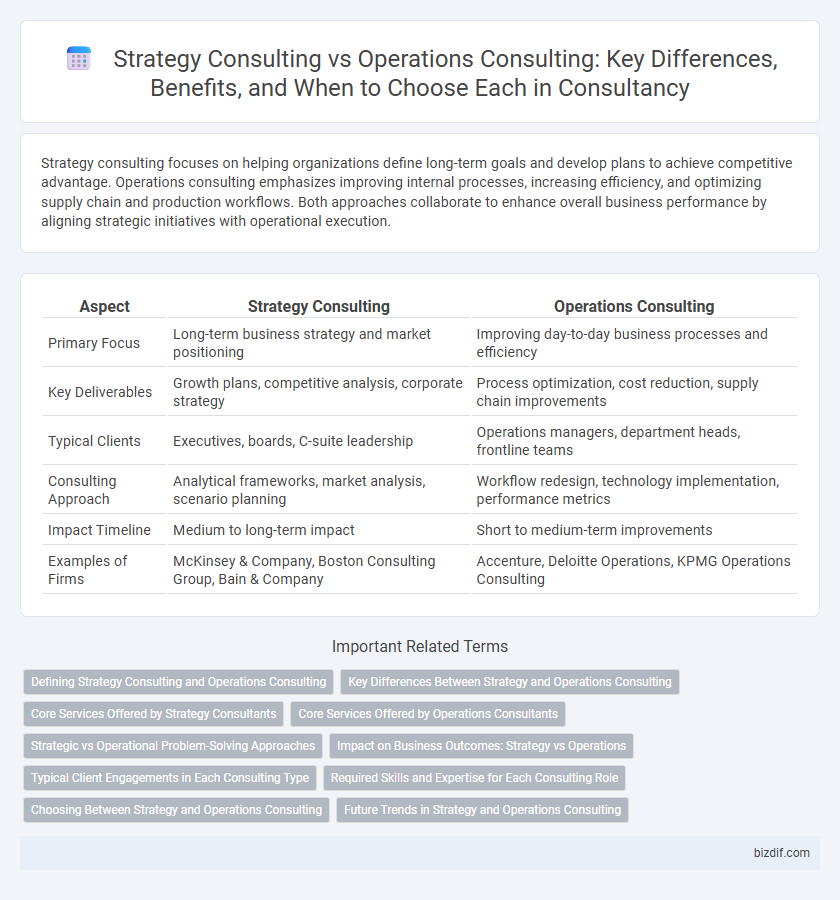Strategy consulting focuses on helping organizations define long-term goals and develop plans to achieve competitive advantage. Operations consulting emphasizes improving internal processes, increasing efficiency, and optimizing supply chain and production workflows. Both approaches collaborate to enhance overall business performance by aligning strategic initiatives with operational execution.
Table of Comparison
| Aspect | Strategy Consulting | Operations Consulting |
|---|---|---|
| Primary Focus | Long-term business strategy and market positioning | Improving day-to-day business processes and efficiency |
| Key Deliverables | Growth plans, competitive analysis, corporate strategy | Process optimization, cost reduction, supply chain improvements |
| Typical Clients | Executives, boards, C-suite leadership | Operations managers, department heads, frontline teams |
| Consulting Approach | Analytical frameworks, market analysis, scenario planning | Workflow redesign, technology implementation, performance metrics |
| Impact Timeline | Medium to long-term impact | Short to medium-term improvements |
| Examples of Firms | McKinsey & Company, Boston Consulting Group, Bain & Company | Accenture, Deloitte Operations, KPMG Operations Consulting |
Defining Strategy Consulting and Operations Consulting
Strategy consulting involves advising organizations on high-level decisions to drive long-term growth, market positioning, and competitive advantage by analyzing industry trends, business models, and corporate objectives. Operations consulting focuses on improving the efficiency and effectiveness of internal processes, supply chains, and day-to-day activities to optimize performance and reduce costs. Both consulting types require deep expertise but target different aspects of business transformation for maximum organizational impact.
Key Differences Between Strategy and Operations Consulting
Strategy consulting primarily focuses on high-level business decisions, such as market entry, competitive positioning, and long-term growth plans, while operations consulting emphasizes improving internal processes, efficiency, and day-to-day business functions. Strategy consultants analyze market trends, financial models, and organizational structure to guide corporate direction, whereas operations consultants target supply chain management, process optimization, and cost reduction initiatives. The key difference lies in strategy consulting shaping the 'what' and 'why' of business goals, whereas operations consulting addresses the 'how' to execute and deliver those goals effectively.
Core Services Offered by Strategy Consultants
Strategy consultants specialize in core services such as market analysis, competitive positioning, growth strategy development, and business model innovation. They provide actionable insights on corporate strategy, mergers and acquisitions, and long-term financial planning. Their expertise helps organizations define vision, optimize resource allocation, and identify new market opportunities for sustainable competitive advantage.
Core Services Offered by Operations Consultants
Operations consultants primarily focus on enhancing internal processes, supply chain management, and production efficiency to optimize overall business performance. They offer core services such as process redesign, operational cost reduction, and implementation of performance metrics to drive productivity improvements. By leveraging data analytics and technology integration, operations consultants enable businesses to streamline workflows and achieve sustainable operational excellence.
Strategic vs Operational Problem-Solving Approaches
Strategy consulting emphasizes long-term vision and high-level decision-making to identify market opportunities and competitive advantages, primarily addressing strategic challenges faced by senior leadership. Operations consulting focuses on optimizing internal processes, enhancing efficiency, and improving day-to-day business functions through detailed analysis and implementation of best practices. The strategic problem-solving approach prioritizes setting organizational direction, while the operational approach targets execution and process improvement to achieve strategic goals.
Impact on Business Outcomes: Strategy vs Operations
Strategy consulting primarily drives long-term business growth by identifying market opportunities and crafting competitive advantages, which leads to transformative shifts in company direction. Operations consulting enhances business efficiency and productivity by optimizing processes, reducing costs, and improving supply chain management, resulting in immediate performance improvements. Both consulting types significantly impact business outcomes through distinct approaches: strategy sets the future vision, while operations ensures effective execution.
Typical Client Engagements in Each Consulting Type
Strategy consulting engagements typically involve corporate growth planning, market entry analysis, and competitive positioning to help clients define long-term business goals and direction. Operations consulting focuses on process optimization, supply chain management, and cost reduction initiatives aimed at enhancing efficiency and operational performance. Clients seeking strategic transformation often hire strategy consultants, while those targeting day-to-day operational improvements engage operations consultants.
Required Skills and Expertise for Each Consulting Role
Strategy consulting demands strong analytical skills, expertise in market analysis, competitive positioning, and high-level problem-solving abilities to drive business growth and long-term planning. Operations consulting requires proficiency in process optimization, supply chain management, and efficiency improvement, with hands-on experience in implementing practical solutions and change management. Both roles necessitate excellent communication and stakeholder management skills to effectively influence decision-making and deliver actionable recommendations.
Choosing Between Strategy and Operations Consulting
Strategy consulting centers on high-level decision-making, business model innovation, and long-term growth planning, while operations consulting focuses on process optimization, cost reduction, and improving day-to-day efficiency. Choosing between them depends on whether a company needs transformational insights for future positioning or practical solutions for current operational challenges. Clients seeking competitive advantage through market analysis and corporate strategy should opt for strategy consulting, whereas those aiming to enhance productivity and streamline workflows benefit more from operations consulting.
Future Trends in Strategy and Operations Consulting
Strategy consulting increasingly integrates artificial intelligence and advanced data analytics to anticipate market disruptions and guide long-term innovation. Operations consulting evolves through automation technologies and process optimization, enhancing supply chain resilience and operational efficiency. Future trends emphasize digital transformation, sustainability integration, and agile methodologies to drive competitive advantage in both domains.
Strategy consulting vs Operations consulting Infographic

 bizdif.com
bizdif.com